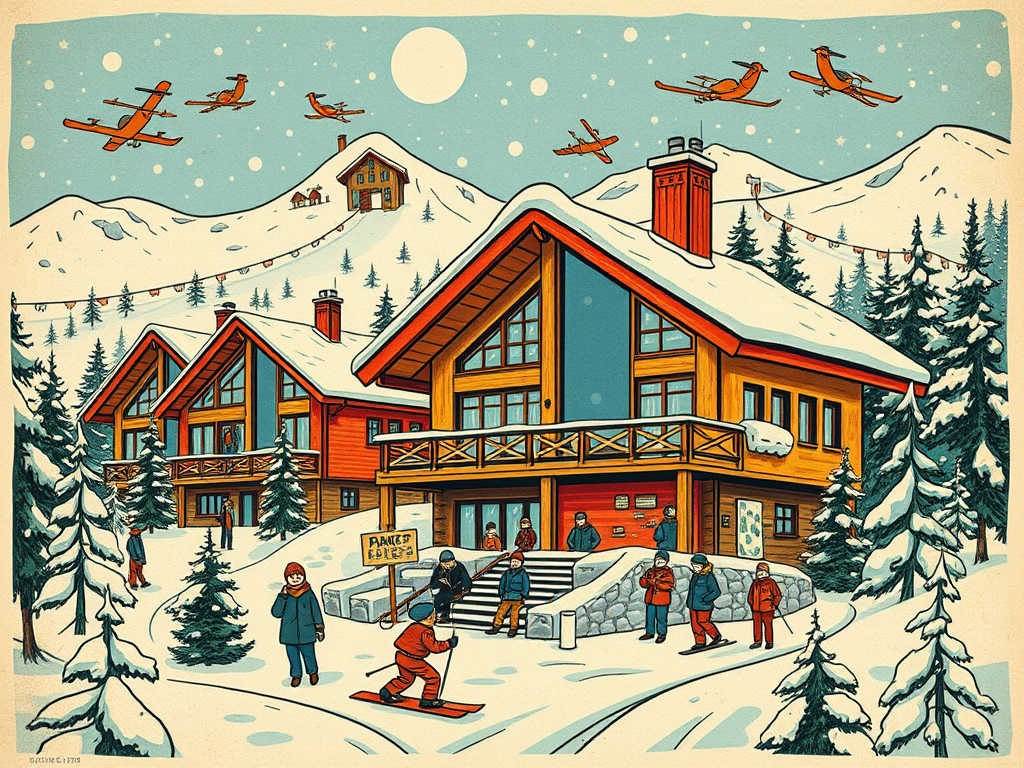
Seasonal Demand: Investing in Ski Chalets and Winter Tourism Properties in Greece
Reading time: 15 minutes
Table of Contents
- Introduction
- The Greek Winter Tourism Landscape
- Key Ski Destinations in Greece
- Economic Impact of Winter Tourism
- Investment Opportunities in Greek Ski Chalets
- Market Trends and Analysis
- Financing Options for Winter Property Investments
- Legal Considerations for Foreign Investors
- Environmental and Sustainability Factors
- Future Outlook for Greek Winter Tourism
- Conclusion
- FAQs
Introduction
When most people think of Greece, images of sun-soaked beaches and ancient ruins come to mind. However, this Mediterranean country offers a surprisingly robust winter tourism sector, complete with picturesque ski resorts and cozy mountain retreats. As investors increasingly seek diversified portfolios and unique opportunities, the Greek winter property market has emerged as an intriguing option. This comprehensive analysis will delve into the nuances of investing in ski chalets and winter tourism properties in Greece, exploring economic trends, market dynamics, and future prospects.
The Greek Winter Tourism Landscape
Greece’s winter tourism industry, while not as internationally renowned as its summer counterpart, has been steadily growing over the past decade. The country boasts over 20 ski resorts spread across its mountainous regions, from Macedonia in the north to the Peloponnese in the south. These resorts cater to both domestic and international visitors, offering a unique blend of Mediterranean culture and alpine experiences.
Historical Development
The development of Greece’s ski resorts began in the mid-20th century, primarily catering to domestic tourists. However, in recent years, there has been a concerted effort to attract international visitors and investors. This shift has been driven by several factors:
- Diversification of the tourism economy
- Investment in infrastructure and facilities
- Marketing campaigns targeting winter sports enthusiasts
- Increasing recognition of Greece as a year-round destination
Key Ski Destinations in Greece
Understanding the geography of Greek ski destinations is crucial for potential investors. Some of the most prominent areas include:
1. Arachova and Mount Parnassos
Located just a two-hour drive from Athens, Arachova is often referred to as the “Winter Mykonos.” Its proximity to the ancient site of Delphi makes it a unique destination that combines skiing with cultural tourism. The nearby Mount Parnassos Ski Center is the largest and most developed in Greece.
2. Kalavryta
Situated in the northern Peloponnese, Kalavryta is a historic town with a modern ski resort. Its location makes it easily accessible from Athens and Patras, attracting a mix of day-trippers and overnight visitors. For those interested in property for sale in peloponnese, this area offers both winter and summer appeal.
3. Karpenisi
Known as the “Switzerland of Greece,” Karpenisi is located in central Greece and offers a more secluded mountain experience. Its ski resort, Velouhi, is popular among experienced skiers and snowboarders.
Economic Impact of Winter Tourism
The economic significance of winter tourism in Greece cannot be overstated. While it currently represents a smaller portion of the overall tourism sector, its impact is growing:
Direct Economic Contributions
- Employment generation in ski resorts and related services
- Revenue from ski passes, equipment rentals, and lessons
- Increased occupancy rates in mountain accommodations
Indirect Economic Benefits
- Stimulation of local economies in mountain communities
- Extended tourism season, reducing seasonal unemployment
- Development of supporting industries (e.g., winter sports equipment manufacturing)
According to recent data from the Greek Tourism Confederation (SETE), winter tourism contributes approximately 10% to the country’s overall tourism revenue. This figure has been growing at an average rate of 5% annually over the past five years, indicating a positive trend for investors.
Investment Opportunities in Greek Ski Chalets
The Greek winter property market offers a range of investment opportunities, from luxury ski chalets to more modest mountain apartments. Key considerations for investors include:
Property Types
- Ski-in/ski-out chalets
- Boutique hotels and lodges
- Apartment complexes near ski resorts
- Traditional stone houses in mountain villages
Investment Strategies
- Buy-to-let for short-term holiday rentals
- Long-term appreciation in developing ski areas
- Mixed-use properties combining residential and commercial elements
- Renovation and resale of older properties
Investors should note that properties in established ski resorts like Arachova tend to command higher prices but offer more stable rental income. Emerging destinations may present better value but come with higher risk and potentially longer ROI timelines.
Market Trends and Analysis
The Greek winter property market has shown resilience even in the face of economic challenges. Key trends include:
Price Dynamics
Property prices in popular ski destinations have seen steady growth, with an average annual increase of 3-5% over the past five years. However, this varies significantly by location:
- Arachova: 7-10% annual price growth
- Kalavryta: 4-6% annual price growth
- Emerging destinations: 2-4% annual price growth
Demand Patterns
Demand for winter properties in Greece is driven by both domestic and international buyers. Domestic demand has remained strong, particularly among affluent Athenians seeking weekend retreats. International interest has been growing, with buyers from:
- Western Europe (particularly Germany and the UK)
- Russia and Eastern Europe
- Middle East (UAE, Saudi Arabia)
Rental Market
The short-term rental market for ski properties in Greece has been boosted by platforms like Airbnb. Average occupancy rates during the winter season (December to March) range from 60-80% in popular resorts, with peak periods reaching near 100% occupancy.
Financing Options for Winter Property Investments
Financing a winter property investment in Greece requires careful consideration of available options:
Greek Bank Mortgages
Greek banks have become more open to providing mortgages to foreign buyers in recent years. However, terms can be strict:
- Loan-to-Value (LTV) ratios typically capped at 70-75%
- Interest rates ranging from 3.5-5% for euro-denominated loans
- Stringent income and credit checks
International Financing
Some investors opt for financing through banks in their home countries, which may offer more favorable terms. This can be particularly advantageous for buyers from countries with lower interest rates.
Developer Financing
In some cases, property developers offer in-house financing options, which can be more flexible than traditional bank mortgages. These often come with higher interest rates but may have less stringent qualification criteria.
Legal Considerations for Foreign Investors
Navigating the legal landscape is crucial for foreign investors in the Greek property market:
Property Ownership Laws
Greece has relatively open policies for foreign property ownership, but there are some restrictions in border areas and islands. Most ski resort areas do not fall under these restrictions.
Tax Implications
Foreign investors should be aware of various taxes associated with property ownership in Greece:
- Property Transfer Tax: 3.09% of the property’s value
- Annual Property Tax (ENFIA): Based on the property’s size and location
- Capital Gains Tax: 15% on property sales (with some exemptions)
- Rental Income Tax: Progressive rates up to 45%
Golden Visa Program
Greece’s Golden Visa program offers residency permits to non-EU nationals investing at least €250,000 in Greek real estate. This can be an attractive option for investors seeking both property investment and EU residency rights.
Environmental and Sustainability Factors
Investing in winter tourism properties comes with unique environmental considerations:
Climate Change Impact
The long-term viability of ski resorts is increasingly tied to climate change concerns. Investors should consider:
- Historical snow data and future projections
- Resort investments in snowmaking technology
- Diversification of activities to include non-snow-dependent options
Sustainability Initiatives
Many Greek ski resorts are adopting sustainable practices to mitigate environmental impact and appeal to eco-conscious tourists. These include:
- Energy-efficient snowmaking systems
- Use of renewable energy sources
- Waste reduction and recycling programs
Properties aligned with these sustainability efforts may have a competitive advantage in the long term.
Future Outlook for Greek Winter Tourism
The future of Greek winter tourism and associated property investments looks promising, albeit with some challenges:
Growth Projections
Industry analysts project continued growth in the Greek winter tourism sector, with an estimated annual increase of 4-6% in visitor numbers over the next decade. This growth is expected to drive demand for quality accommodation and potentially increase property values.
Infrastructure Development
The Greek government has announced plans for significant infrastructure investments in mountain regions, including:
- Improved road access to ski resorts
- Upgrades to ski lift systems
- Development of year-round mountain tourism facilities
These investments are likely to enhance the attractiveness of winter properties as investment options.
Market Maturation
As the Greek winter tourism market matures, investors can expect:
- Increased professionalization of property management services
- Growing interest from international hotel chains
- Potential for luxury branded residences in prime ski locations
Conclusion
Investing in ski chalets and winter tourism properties in Greece presents a unique opportunity to capitalize on a growing market segment. While not without challenges, the sector offers potential for both capital appreciation and rental income. The combination of established ski resorts and emerging destinations provides options for different investment strategies and risk profiles.
As with any real estate investment, thorough due diligence is essential. Prospective investors should carefully consider location, property type, financing options, and long-term market trends. The impact of climate change on winter tourism destinations is a critical factor that cannot be overlooked.
Despite these considerations, the Greek winter property market’s growth trajectory, coupled with the country’s efforts to diversify its tourism offerings, suggests a positive outlook for well-informed investors. As Greece continues to position itself as a year-round destination, properties in ski and mountain areas are likely to benefit from increased demand and infrastructure improvements.
For those willing to look beyond the traditional sun-and-sea image of Greece, winter tourism properties offer an exciting frontier in Mediterranean real estate investment.
FAQs
1. What is the best time to invest in Greek ski properties?
The best time to invest is typically during the off-season (spring and summer) when prices may be more negotiable and there’s less competition from other buyers. This also allows time for any renovations or preparations before the winter season begins.
2. Are there any restrictions on foreign ownership of ski chalets in Greece?
Generally, there are no significant restrictions on foreign ownership of ski chalets in Greece. However, properties in certain border areas may require additional permits. It’s advisable to work with a local real estate lawyer to ensure compliance with all regulations.
3. How does the rental market work for ski properties in Greece?
The rental market is primarily seasonal, with peak demand from December to March. Many owners use property management companies or online platforms like Airbnb to handle short-term rentals. Some properties may also attract summer visitors for mountain activities, potentially extending the rental season.
4. What are the ongoing costs associated with owning a ski chalet in Greece?
Ongoing costs typically include property taxes, maintenance fees, utilities, and potentially management fees if using a rental service. Insurance costs may be higher for mountain properties due to weather-related risks. It’s important to factor in potential off-season maintenance and heating costs.
5. How might climate change affect investments in Greek ski properties?
Climate change poses a long-term risk to ski resorts worldwide, including in Greece. Investors should consider resorts with higher altitudes, north-facing slopes, and investments in snowmaking technology. Diversifying into properties suitable for year-round mountain activities can help mitigate this risk.

Article reviewed by Michelle Hope, Real Estate and Investment Expert, on March 28, 2025




